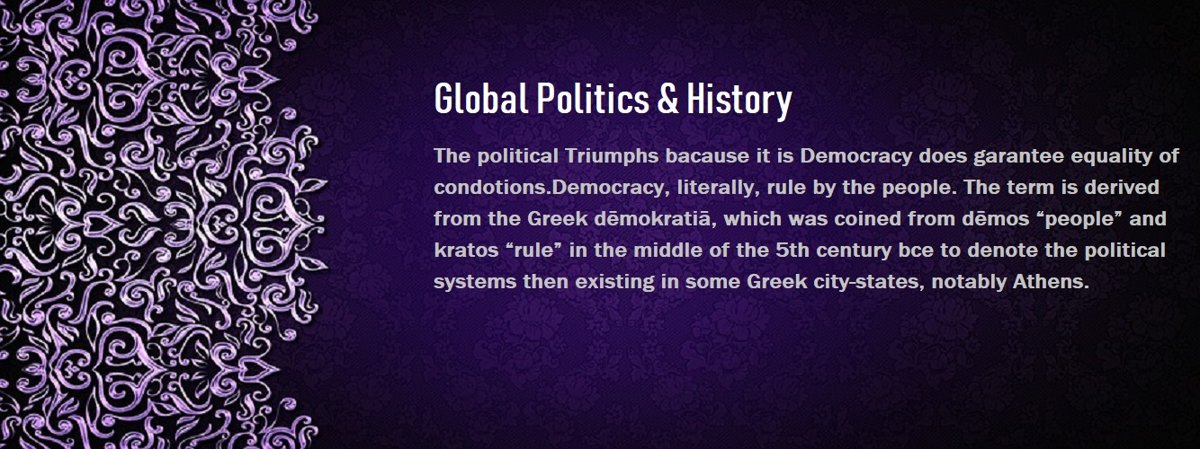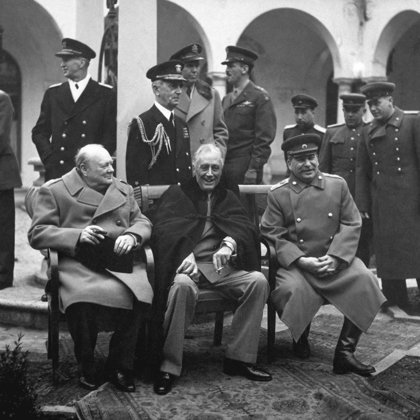THE RISE OF POPULISM ,AND AGGRESSIVE EUROPEAN NATIONALISM AFTER WORLD WAR II IN 1945 WAS A SYMPTOM OF DEEPER CRISIS AT THE HEART OF NEO - LIBERALISM CAUSED BY IT'S FAILURE TO DELIVER FOR ECONOMY AND SOCIETY.AND THE CRISIS IN THE WESTERN POLITICS.
 In
February, 1945, Joseph Stalin, Winston Churchill and Franklin D.
Roosevelt met to discuss what would happen after the Second World War.
The conference was held in Yalta on the north coast of the Black Sea in
the Crimean peninsula. With Soviet troops in most of Eastern Europe,
Stalin was in a strong negotiating position. Roosevelt and Churchill
tried hard to restrict post-war influence in this area but the only
concession they could obtain was a promise that free elections would be
held in these countries. Poland was the main debating point. Stalin
explained that throughout history Poland had either attacked Russia or
had been used as a corridor through which other hostile countries
invaded her. Only a strong, pro-Communist government in Poland would be
able to guarantee the security of the Soviet Union.
In
February, 1945, Joseph Stalin, Winston Churchill and Franklin D.
Roosevelt met to discuss what would happen after the Second World War.
The conference was held in Yalta on the north coast of the Black Sea in
the Crimean peninsula. With Soviet troops in most of Eastern Europe,
Stalin was in a strong negotiating position. Roosevelt and Churchill
tried hard to restrict post-war influence in this area but the only
concession they could obtain was a promise that free elections would be
held in these countries. Poland was the main debating point. Stalin
explained that throughout history Poland had either attacked Russia or
had been used as a corridor through which other hostile countries
invaded her. Only a strong, pro-Communist government in Poland would be
able to guarantee the security of the Soviet Union.
Europe in the period after 1945 has seen a clear, if gradual, shift towards cooperation over conflict. At this time, in the wake of the Second World War, nations lay in tatters and the continent was soon to be divided completely in half with spheres of US and Soviet influence.In the 19th century, a wave of romantic nationalism swept the European continent, transforming its countries. Some newly formed countries, such as Germany and Italy were formed by uniting various regional states with a common "national identity". Others, such as Greece, Serbia, Poland, Romania and Bulgaria, were formed by uprisings against the Ottoman Empire and Russia. Nationalism was the ideological impetus that, over the century, transformed Europe. Rule by monarchies and foreign control of territory was replaced by self-determination and newly formed national governments.European nationalism, in its modern sense, was born out of the desire of a community to assert its unity and independence. In the 19th century there began a determined struggle to realise nationalist aspirations.The French Revolution had inspired people all over Europe. It spread the ideas of liberty, equality and fraternity and generated the spirit of nationalism.Napoleon, though he established a monarchy in France, carried forward the revolutionary ideals of equality and nationalism.Napoleon’s empire gave to Europe a form of unity, even though it was imposed by him through conquests. A new concept emerged which bound people together with a sense of belonging and unity. Nations began to be formed by those who shared a common tradition and common territory.Between 1830 and 1848, a number of revolutions broke out. Though most of them failed, a few of these revolutions succeeded. Belgium rose in revolt against the union with Holland and the consequent Dutch domination. the European powers declared that Belgium would be an independent country. In 1831 Belgium was created a separate kingdom with Leopold as the king.While Belgium was successful, the Polish revolt was crushed by Russia.Greece was under Turkey. Towards the end of the 18th century the national consciousness of the Greeks was stimulated by an intellectual revival which recalled the glories of the ancient Hellas.The struggle for independence began in 1821. By the Treaty of Adrianople (1829) Turkey recognised the independence of Greece. The republic that was set up in Greece was replaced by a monarchy in 1832. The independence of Greece was an incident of great significance. It provided the first example of the victory of nationalism since the downfall of Napoleon.Nationalism has a long history in European politics from ancient Rome to modern times. When it came of age in France on July 14th 1789; it posed a fatal threat to traditionalist administrations and feudalism. In Europe’s post Napoleonic years the autocrats decided to deal with the antediluvian but intensifying problem by suppressing its advocates with tyranny and totalitarianism. Austrian’s most accomplished Diplomat, Conservative, Sophisticate and Dictator Klaus Von Metternich led the futile campaign. Two of Europe’s strongest xenophobic states were Belgium and Poland but remarkably both these countries demonstrated their nationalistic objectives in contrasting ways. Belgium through peaceful political negotiation and Poland with a force that would be their own downfall. The former succeeded and the latter failed. However, both are flawless examples of the ineffectuality of any crusade to stop the relentless rage of the dogma of nationalism.The ideology and power of Nationalism as a revolutionary force was by no means new in Europe by the arrival of the 19th Century. In fact, Julius Caesar, an early advocator of jingoism, communicated to his generals the importance of nationalism as a derivative of patriotism and made reference to it in his writings of The Gallic Wars (58BCE – 51BCE) when he wrote of the ‘patriotic’ Roman Army General Titurius at war with the Gauls; “On the score of patriotism he has now regard to gratitude for the kindness of Caesar”.(Caesar, 51 BCE) One of the immediate causes of the French Revolution had been the failure of a patriotic reform movement under the ancient regime. Nationalist sentiment had then turned to revolutionary means for fulfilment. The result was that ‘nationalism became the spearhead of an attack on feudalism’, and from the start of the revolution the appellation ‘patriote’ was practically synonymous with revolutionary.’ Consequently, Nationalism was very powerful in the period 1814 to 1848. France and Great Britain were strong nation states and as such stimulated other nations including Germany, Italy and Russia toward unification. Germans recognised that every nation had a particular ‘Volksgeist’ or spirit; “Each people possesses its own cultural traits shaped by ancestral history and the experience of a particular physical environment, and mentally constructs its social life through language, literature, religion, the arts, customs, and folklore inherited from earlier generations.” And very quickly a pan-European desire for nationality continued to gain momentum. This aspiration was quickly outlawed by reactionary forces which led to the formation of secret societies such as Joseph Mazzini’s ‘Young Italy’, Carbonari in Italy and the German Buschenschaft which meant that nationalistic ideology was not going to evaporate. The idea that language should have its own nation was a terrifying one to the Austrian Empire since it contained dozens of subjugated language groups and consequently if nationalism were to proceed the empire would be dissolved; “Individual freedom was finding expression in politics and in the arts. Liberal movements were tied to nationalism which was defined by language and cultural tradition. Nationalism threatened Europe and its Monarchies and was therefore unacceptable to the Congress of Vienna. Under these realistic fears it had to act.In post Napoleonic Europe ‘The Concert of Europe’ was an unpremeditated catalyst for the escalation of Nationalism in the ‘Age of Metternich’. The rise of nationalism, the unification of Germany, the ‘Risorgimento’ in Italy enumerates some of the main constituents to the ineffectiveness of the Concert and, as such, made the Concert the originator of its own demise. The general consensus across Europe was that nationalism was a force to be reckoned with and when German nationalists began assassinating reactionary leaders, Metternich, unaware of his powerlessness against it, confirmed its supremacy by pushing the Karlsbad Decrees (1819). German poets, authors and composers, including Brothers Grimm and Beethoven, were beginning to inspire moods of national pride in the German states with their work. Metternich was rendered powerless against ‘romantic nationalism’ manifesting itself in the arts. German philosopher and ‘enemy of human liberty’ (Berlin, 2003) Johann Fichte spoke about how Germans should recognise a broad national identity. He called Germany the ‘Fatherland’ and spoke about Germans living without interference from foreign powers. Fichte’s prominent position in Germany gave his statements great credence. Metternich had fervently guarded Austria’s interests with great skill and it was not his fault, but the fault of ages, that Austria’s interests were in complete antagonism to those of German and Italian nationality.
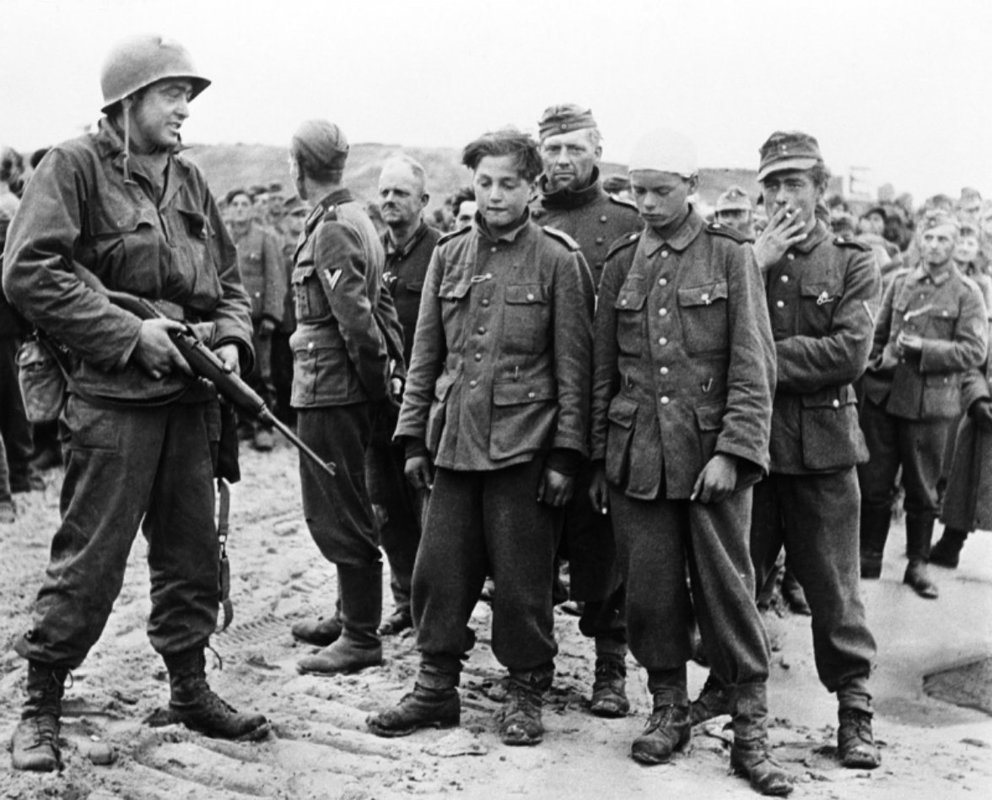 An American soldier stands guard over captured German POWs of the 716th Static Infantry Division of the Wehrmacht during the Normandy landings. Omaha Beach, Vierville-sur-Mer, Calvados, Lower Normandy, France. 6 June 1944. General Charles de Gaulle (center) shaking hands with children, two months after the German capitulation in Lorient, France, in July of 1945. Lorient was the location of a German U-boat (submarine) base during World War II. Between January 14 and February 17, 1943, as many as 500 high-explosive aerial bombs and more than 60,000 incendiary bombs were dropped on Lorient. The city was almost completely destroyed, with nearly 90% of the city flattened.
An American soldier stands guard over captured German POWs of the 716th Static Infantry Division of the Wehrmacht during the Normandy landings. Omaha Beach, Vierville-sur-Mer, Calvados, Lower Normandy, France. 6 June 1944. General Charles de Gaulle (center) shaking hands with children, two months after the German capitulation in Lorient, France, in July of 1945. Lorient was the location of a German U-boat (submarine) base during World War II. Between January 14 and February 17, 1943, as many as 500 high-explosive aerial bombs and more than 60,000 incendiary bombs were dropped on Lorient. The city was almost completely destroyed, with nearly 90% of the city flattened.
In conclusion it is clear that after half a century of tension and conflict there was a real push for closer ties and cooperation within Europe after 1945. Whilst the East came under the shadow of the USSR and stagnated, practically every nation to the west of the Berlin Wall saw sense in the notion of a united European union as a means to economic growth and security; even if they didn’t initially want a part in it themselves as with Britain. It was important, especially for the French, that Germany be contained and controlled. The ECSC brought these two nations together with shared resources and has led to over 60 years of peaceful friendship. Second the former European powers had lost much of their global influence and fallen far behind the US and Soviet Union; the only way for them to have a significant voice on an international stage was by joining together to work for mutual gain.The Austrian Empire was composed of a number of kingdoms inhabited by different races, speaking different languages and having different cultures. There were the Germans in Austria, the Czechs in Bohemia, the Magyars in Hungary, the Poles in Galicia, the Italians in Lombardy and Venice and the Slavs in south-east Austria. All these peoples had become conscious of their national unity and had developed national aspirations.Revolts had broken out in France in 1830 and 1848. The Revolt of 1848 ushered in a period of widespread revolts throughout the Austrian Empire. The Magyars of Hungary and the Slavs of Bohemia clamoured for national autonomy and constitutional government.Finally in 1867 Hungary was recognised as an independent kingdom. A nationalist movement had also started in Prague. There the Czechs rose in a nationalist revolt demanding self-government for their kingdom. Austrian Emperor was forced to recognise the Czech Government. Though temporarily successful, most of these movements within the Austrian Empire ultimately ended in disaster.In its relentless pursuit of a consolidated federation of Europe, united in the preservation of ‘Conservatism’ posing as peace and prosperity, the Concert, petrified at the bloodthirstiness of the Revolutionary nationalistic proletariat, proceeded to contaminate the noble ideals of the Enlightenment. These ideals revealed themselves as liberalism, romanticism and ultimately nationalism which endangered the ‘Old Regime’ perceived, by the lower classes, as corrupt and abusive in the pursuit of new profits garnished from the Industrial Revolution that rampantly swept across Western Europe. Napoleon had recognised the seeds of nationalism and manipulated the ideology and turned it into a source of aggression by exploiting this patriotic dynamism and, by so doing, scared the powers of Europe into the belief that such ideology was destructive and life-threatening to the well being of the European Monarchy and the inevitable domino effect for the upper classes. French conquests awakened nationalism in Europe and individual freedom was finding expression in the philosophy of the free man (or woman) within the free independent state defined by common language and cultural boundaries and the calls for independence and political freedom across Europe were loud and vexing to the Conservative upper echelons’. This pan-European demand for nationalism as a force for change was not only obvious in the bigger nations but also from the voices of the smaller countries such as Belgium and Poland.Belgium was an artificial state that was put together in 1830-31 by the international powers as a political compromise and an experiment in building one state out of two nationalities. Outside of Brussels it consisted of Dutch-speakers in Flanders, its northern half bordering the Netherlands, and French-speakers in Wallonia, its southern half bordering France. Throughout its entire history Brussels was a Dutch-speaking town, until the middle of the 19th century, when the deliberate “frenchification” policy of the Belgian authorities succeeded in turning it into a predominantly French-speaking city. Belgium was feeling only the tremors of European Revolution in 1848 because by then it was under a relatively new constitution. The one nationalist rising to involve the international community had occurred in Belgium in August 1830. Here, a coalition of Catholics and Liberals declared their country’s independence from Holland. Prussia, fearful of two revolutionary states bordering its Rhineland provinces wanted to send in troops. France threatened intervention and Britain expressing the objective of ‘an independent Belgium free from French and Dutch alike’ (Clarke, 1989) consulted with France and they announced agreement on non-intervention and issued a protocol to break Dutch-Belgian ties. Some years later a final international guarantee of Belgian independence was declared. The painless solution of the Belgian problem indicated that the European concert could work effectively in the face of demanded nationalism. The episode clearly demonstrates that nationalism was not really the threat to European integration but the violence associated with its rejection. Historians argue that Belgium escaped the ‘spring of nations’ because, like Britain after the Glorious Revolution (1688), Belgian powers had learned its lessons almost two decades earlier. Although north and south Belgium had two different language based cultures both had common ground with discontentment at protestant suppression. Violent street riots inspired by the 1830 French insurrections soon led to a ‘Declaration of Independence’ from Dutch suppression and a constitutional monarchy. The Belgians were satisfied, got on with the work of prosperity, oblivious to the nationalistic endeavours of their continental neighbours. The country was one of the small pockets outside of Britain that was feeling the impact of the Industrial Revolution and with it came a new sense of independence and financial freedom. But the angry Belgian artisans and workers were feeling stifled by advancing mechanisation and the government, unlike other more aggressive European states, recognised this reality and responded quickly to demands for concessions before opposition took a deadly toll. By 1848; “Belgium was widely admired as a model for liberals in other countries.” Clearly, nationalistic ideals had achieved a liberal society, through political negotiation, that was now a role model for the rest of Europe and justification for the ‘patriotic’ movement.
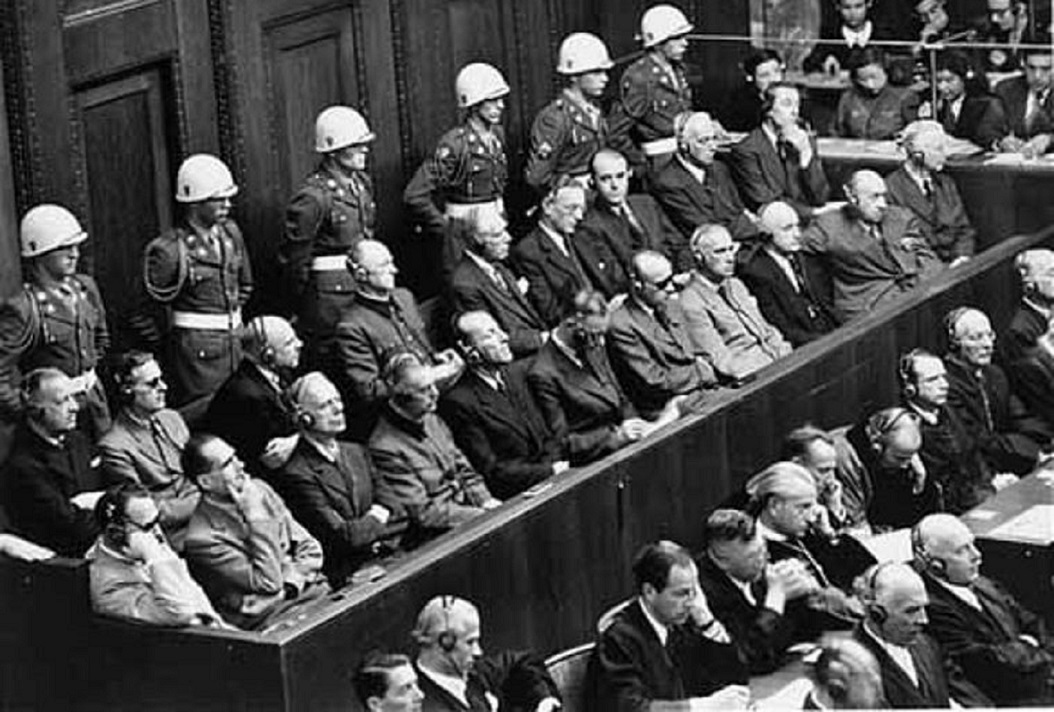
World history was written in the courtroom of the Nuremburg Palace of Justice. This is where leaders of the Nazi regime had to answer for their crimes before an International Military Tribunal between November 20, 1945 and October 1, 1946. The trials had an enormous influence on the development of international criminal law right up to the present. Courtroom 600 remains a working courtroom to this day. An information and documentation center, the Nuremberg Trials Memorial , is located on the top floor of the Courthouse. It provides insights about the defendants and their crimes, the Subsequent Nuremberg Trials of 1946-49, and the impact of the Nuremberg Trials up to the present.
By 1850 Great Britain, France and Russia were the three major powers
in Europe. However, the forthcoming unification of Germany and Italy was
to change the face of Europe dramatically. In the last three decades of
the 19th Century Europe entered a period of major economic, social,
political and cultural change. The second Industrial Revolution brought
about scientific and technological advances and the arrival of steel and
electricity transformed manufacturing.Like
Italy, Germany was also divided into small kingdoms. There were about
three hundred small kingdoms and principalities in Germany. After
conquering Germany, Napoleon Bonaparte had formed a confederation of the
Rhine consisting of thirty nine states created out of the former three
hundred states. The Germans, under Napoleon’s rule, became familiar with
democratic and nationalist ideas.After the downfall of Napoleon, these
thirty nine German kingdoms were reorganised into a loose German
Confederation with Austria as its president. Though Austria was a sworn
enemy of democracy and liberalism, German nationalist aspirations did
not die out.The person responsible for the unification of all these
small German kingdoms was Otto von Bismarck. Bismarck, the greatest
statesman of all times, was appointed by King William I as the
Chancellor (1862) (Prime Minister) of Prussia.Bismarck devoted himself
to the task of uniting the German states under Prussia. Already after
the failure of the 1848 Revolution, Prussia had emerged as the
undisputed leader of Germany. Bismarck believed that German unification
could be achieved only through a policy of ‘blood and iron’, i.e. the
use of military force. This was so because Austria, which was the
President of the German confederation, would not easily give up her
leadership of the confederarus, France was also hostile to the idea of a
strong united Germany as her neighbour.Bismarck achieved his aim of
unifying Germany through three wars against Denmark, Austria and France.
Bismarck first allied with Austria against Denmark. Defeated by the
joint forces of Austria and Prussia, Danish king handed over Schleswig
and Holstein to Prussia and Austria.Austria and Prussia, however, fell
out over their rights on the two provinces. In the war of 1866, Bismarck
succeeded in defeating Austria. As a result Austria resigned from the
German Confederation and her supremacy in North Germany was fully
abolished. Prussia gained control over the North German states. The King
of Prussia became the hereditary head of the north German states.
Venetia was given to Italy.The third war was fought against France in
1870-71. France was provoked to declare war against Prussia. When
Napoleon III declared war on Prussia in 1870, the Southern German states
joined the North in the Franco-German war. France was completely
defeated in the war (Battle of Sedan). The German victory led to the
political unification of Germany. The Prussian king, William I, was
proclaimed Emperor of Germany. The spirit of nationalism brought about
the unification of Germany. Within a short time a united Germany emerged
as a powerful force in European polity.Cities grew rapidly, political parties developed and the age of mass
politics came into being. The creation of socialist parties and
socialists were being elected across Europe. Unions put forth demands
and engaged in strikes. In the three decades after 1848 Liberalism
prevailed and without the Liberal’s male suffrage, political democracy
and other significant changes would not have occurred. Liberal democracy
emerged as the dominant form of European politics from the second half
of the 19th Century to present day.In the first half of the 19th
Century Germans and Italians
were agitating for political unification. (A political union is a type
of state, which is composed of or created out of smaller states. Unlike a
personal union, the individual states share a common government and the
union is recognized internationally as a single political entity. A
political union may also be called a legislative union or state union.)
After 1848 Germany and Italy were not unified and revolutionaries
remained angry about this. Italian unification came as a result of the
expansion of Piedmont-Piedmont-Sardinia (the peninsulas strongest most
Liberal state) and its monarchy, the House of Savoy.The case of Germany
was somewhat different. German unification was
affected by autocratic manipulation of diplomacy and war. The German
Empire was reactionary and flying in the face of European Liberalism.
German and Italian unification created two new great powers in Europe
and the impact of these changes were to be widely felt for decades to
come.The Political Unification of Italy: Many forces were working
against
Italian unification, the state was very much fragmented, questions of
who rules after unification were toxic, the notion of papal rule was
feared in certain influential quarters and the Habsburg monarchy
presented a formidable obstacle. However, some factors promoted the
‘Risorgimento’ (Resurgence) of Italy. Nationalism was increasing in the
middle and upper class circles. Professionals and academics also sought
it and there was, as always had been, a hatred for Austrian rule over
certain parts of Italy. Most people wanted resurgence independent of the
pope and the Catholic Church.King Victor Emmanuel II (House of Savoy)
was the King of
Piedmont-Sardinia and he aimed to exert his control over the entire
peninsula. He was King of Italy’s most prosperous region and in 1852 he
made the wise decision to appoint the brilliant politician Count Camillo
di Cavour to be his Prime Minister. Cavour was an aristocratic Liberal
and wanted Italian unification by expanding Piedmont-Sardinia. Giuseppe
Mazzini, a political activist, revolutionary, nationalist
and democrat who wanted Italian unification but not by the expansion of
Piedmont-Sardinia. He was an enemy of monarchical control and saw
unification as a ‘common faith and purpose’ that would make Italy a
democracy. He claimed that unification was the work of all the people of
Italy and not just a royal desire. He wanted to mobilise the people and
was involved in setting up numerous political organisations to achieve
not just Italian unification but European unification. His very
existence and propaganda in Italy kept the concept of unification
alive.Alliances And Warfare To Further Italian Unification: Austria’s
domination of Italy was making unification very difficult. Cavour formed
an alliance with Britain and France against Austria in the Crimean War.
In 1854 France and Britain joined the Ottoman empire against Russia and
Cavour saw by pledging Piedmont-Sardinia’s allegiance to the allies as
an opportunity for future Italian unification.
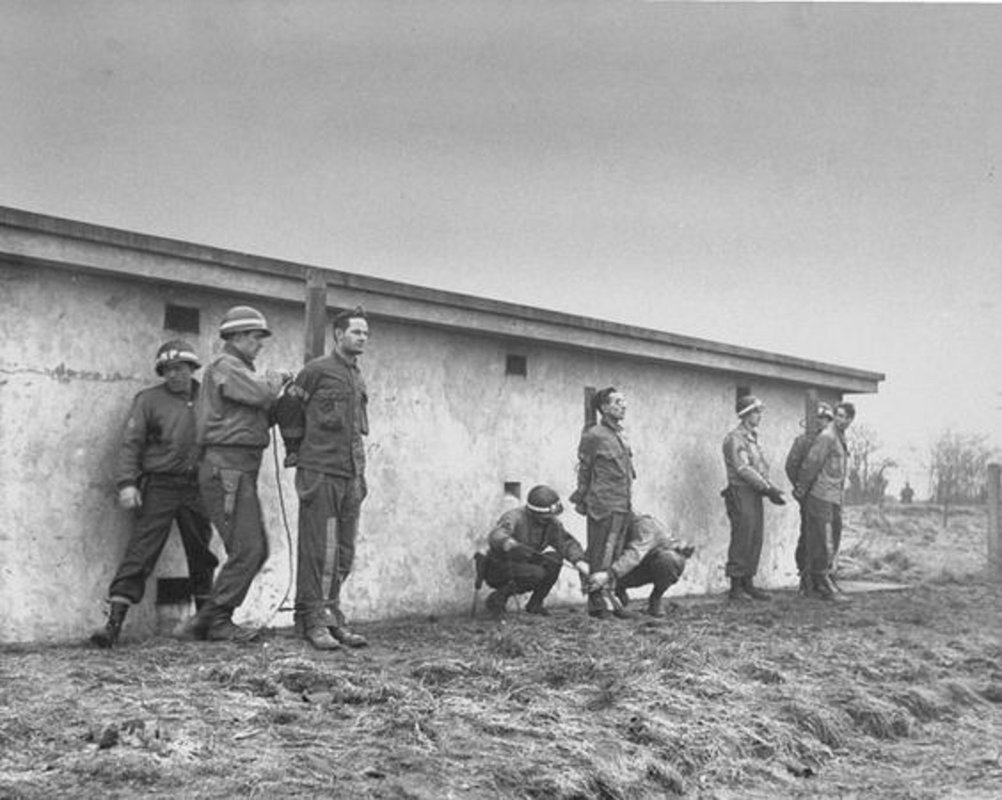 Ten
more executions would follow that evening, but for all of Sergeant
Woods’ experience (and for all of the collected wisdom the military had
at its disposal on proper hanging techniques), the Nuremberg executions
were, it seems, a ghoulishly untidy affair.From mid-January 1945, in the heavily
forested Ardennes Mountains of Belgium, thousands of American, British,
Canadian, Belgian and French forces struggled to turn back the final
major German offensive of World War II. While Allied forces ultimately
triumphed, it was an absolutely vicious six weeks of fighting, with tens
of thousands dead on both sides.
Ten
more executions would follow that evening, but for all of Sergeant
Woods’ experience (and for all of the collected wisdom the military had
at its disposal on proper hanging techniques), the Nuremberg executions
were, it seems, a ghoulishly untidy affair.From mid-January 1945, in the heavily
forested Ardennes Mountains of Belgium, thousands of American, British,
Canadian, Belgian and French forces struggled to turn back the final
major German offensive of World War II. While Allied forces ultimately
triumphed, it was an absolutely vicious six weeks of fighting, with tens
of thousands dead on both sides.
The war succeeded and at the signing of the ‘Peace Of Paris’ (1856) Cavour expressed his desire to the allies for Italian unification and the threat of war with Austria. Napoleon III wanted more influence in Italy and to set up an alliance he proposed a royal union between his nephew and the daughter of King Victor Emmanuel II and that would cement relations between Piedmont-Sardinia and France. Following this, France agreed to cooperate with Piedmont-Sardinia in war against Austria. The Austrians gave the excuse when they proposed recruiting Italian troops to fight for Austrian interests and thus they became the aggressors and forced Prussia and other German states to distance themselves from Austrian aggression. Austria then invaded Piedmont-Sardinia and France mobilised it troops. However, French allegiance to Piedmont-Sardinia was called into question when Napoleon III forged a peace settlement with Austria. He believed that if Italian unification were to happen it would threaten the balance of power in Europe and that would result in damage to France. However, in the Treaty of Turin (1860), Napoleon III agreed to Piedmont-Sardinia’s annexation of most of central and northern Italy and Piedmont-Sardinia ceded Savoy and Nice and so all of northern and central Italy was unified.Garibaldi and The Liberation of Southern Italy: Giuseppe Garibaldi was an Italian military and political figure who had a long career of struggle for Italian unification. A member of Mazzini’s ‘Young Italy’, a political movement aiming for Italian unification, he dedicated himself to the lifelong cause from an early age. After a long exile in Brazil garibaldi returned to Rome during the revolutions of 1848 and offered his services to Piedmont-Sardinia but was rebuffed. He went to Lombardy and assisted the provisional government of Milan against the Austrian occupation. The unsuccessful ‘First Italian war of Independence’ he led his legion to two minor victories. He next went to Rome and defended it against French occupation, which led to the siege of Rome. The French prevailed but a truce was negotiated and Garibaldi withdrew from Rome. After some travel bringing him to America he returned to Italy in 1854 and participated in the Austro-Sardinian War and won victories for Piedmont-Sardinia. Garibaldi took up arms again in 1866 with the full support of the Italian government in the Austro-Prussian war in which Italy had allied with Prussia against Austria and Hungary in the hope of taking Venetia from Austrian rule. He defeated the Austrians and Venetia was ceded. After the war Garibaldi led a political party seeking the capture of Rome, the ancient capital. He led a march into Rome but the papal army with the help of the French were a good match for his badly armed volunteers and after an injury had to withdraw from the papal territory. He was sent to prison and on his release he returned to his island Caprera. He sought the abolition of the papacy as ‘the most harmful of all secret societies’. When the Franco-Prussian war broke out in 1870 the Italians favoured Prussia and the French troops were withdrawn from Rome and the Italian army captured the Papal States without Garibaldi. The newly declared French Third Republic won Garibaldi support, regardless of former French hostilities, and Garibaldi went to France and led an army of volunteers that was never defeated by Prussians. After his return to Italy he retired to Caprera but remained active and even set up the ‘league Of Democracy’ (1879) which advocated universal suffrage, abolition of ecclesiastical property, emancipation of women and maintenance of a standing army. He remained active until his death in 1882.Garibaldi’s involvement in two major conflicts during his life, namely the Austro-Prussian war (1866) in which the Austrians were defeated and Venetia became part of Italy, and the French withdrawal from Rome (1870) making it the nations capital and isolating papal control, at the start of the Franco-Prussian war (1870) led to the final, but somewhat limited, unification of Italy.Limits of Unification: The limits to Italian unification became apparent in the following decades. Most Italians remained loyal to their family, local towns and church as well as to powerful local leaders. The majority of the population were illiterate and most spoke local dialects rather than Italian. Mass emigration to the United States and Argentina only resolved some of the problems of over-population and the Catholic Church was anti-unification condemning it to its loyal supporters as anti-religious and not to be encouraged by participation with its political leaders. This meant, to the predominantly catholic population that to vote would be an act of evil.Italian Politics: The king of Italy ruled through a corrupt and aggressive premier, Francesco Crispi, and his mafia style parliament. He was replaced by Giovanni Giolitti in 1903 and brought stability to Italian political life. In 1904 the non-voting stance of the Catholic church allowed corruption to prosper and they relaxed their rule in the hope that voters would shun the corrupt politicians and mostly defeat any Socialist candidates.
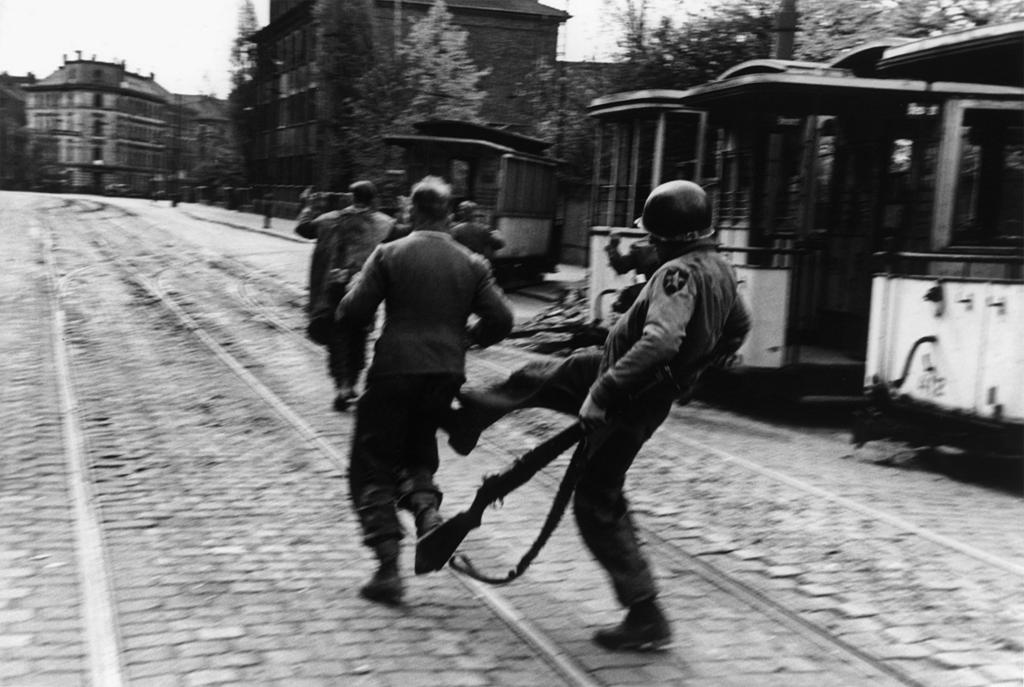 American
Soldier Kicking German POW,near the French village of
Audouville-la-Hubert 30 German Wehrmacht prisoners were massacred by
U.S. paratroopers.Historian Peter Lieb has found that many US and
Canadian units were
ordered to not take prisoners during the D-Day landings in Normandy. If
this view .The Day of Battle" by
Rick Atkinson where he describes Allied war crimes in Italy, and "D-Day:
The Battle for Normandy," by Anthony Beevor. Beevor's latest work is
currently discussed by scholars, and should some of them be proven right
that means that Allied war crimes in Normandy were much more extensive
"than was previously realized".
American
Soldier Kicking German POW,near the French village of
Audouville-la-Hubert 30 German Wehrmacht prisoners were massacred by
U.S. paratroopers.Historian Peter Lieb has found that many US and
Canadian units were
ordered to not take prisoners during the D-Day landings in Normandy. If
this view .The Day of Battle" by
Rick Atkinson where he describes Allied war crimes in Italy, and "D-Day:
The Battle for Normandy," by Anthony Beevor. Beevor's latest work is
currently discussed by scholars, and should some of them be proven right
that means that Allied war crimes in Normandy were much more extensive
"than was previously realized".
The Rise of Italian Nationalism: Aggressive nationalism, forceful colonisation in Africa and Libya and Crispi was forced to resign after his army was crushed in the latter country. He was replaced with Giolitti whose reforms frightened employers and conservatives. Right wing activists objected that Libya was being mismanaged while left wing activists demanded withdrawal and the split was so intense that to get support Giolitti had to strike a deal with Catholic leaders but the deal collapsed and in 1914 he was forced from office. The Italian Liberal state had survived many challenges, but greater ones lay ahead.The Unification of Germany: The unification of Germany, like Italy, had many formidable obstacles. Firstly, in the wake of 1848, the upper classes were wary of change and feared strong nationalistic tendencies which would lead to equalisation of all citizens and thus damaging the status quo. Secondly, which power, Austria or Prussia, could help Germany in the pursuit of unification? Some wanted Austrians excluded from a unified Germany and some wanted Prussians excluded. Thirdly, in both Austria and Prussia repression was rampant and that German unification would not be achieved through liberalism. Prussia had some advantages in territorial possessions, a strong economy and the population was homogenous (German speakers). It was a successful Protestant state and thus was in a strong position to spearhead and advance ‘natural unification’.On the other hand ‘Catholic’ Austria dominated a multinational population. The Habsburg monarchy had a lot to lose by encouraging nationalism that would catch fire within all imperial boundaries. German nationalists were not agreed on the Austria Prussia question and liberals wanted a unified Germany with a parliament independent of Austrian or Prussian aristocracy or autocratic influence.William I, Bismarck and the Resolution of the Constitutional Crisis: The first step in the process was to ensure the monarchy was equal to the task. The Liberal William I took control and made it clear from the outset that he was anxious to serve moderate conservatives but also wanted to rule constitutionally. Liberals won a clear victory and those who favoured German unification now had a public forum in the Prussian parliament of 1858. Businesspersons believed that unification would be good for trade and so the stage was set.Meanwhile the Austrian war against Piedmont-Sardinia and France had divided Prussians; there was contempt for Austria for engineering the war on one side, on the other there were those who were impressed by Italy’s successful bid for unification and the strategy they employed. Thus proving that unification was not as elusive as it seemed. In 1858 pan-German associations formed as unification pressure groups started to appear. The largest of these was Nationalverein (National Union) seeking a constitutional and parliamentary German state.The Prussian government were very suspicious of the National Union because its members favoured political freedom. Members were mostly middle class and had already rebuffed membership of workers unions.Army reform was an issue that would contribute significantly to German unification. The minister of war wanted expensive reforms to the army budget but liberals demanded a draft for all citizens. Government, despite its Liberal majority, sanctioned funds for military reformation and this event was significant tin that it provided parliamentary sanction to the unchallenged power of the Prussian army. The Liberal opposition formed a new party ‘The German Progressive Party’ and declined to vote and the government had to be dismissed. A second Liberal government was then elected but they too rejected army reform and the king was forced to appoint ultra-conservative Count Otto Von Bismarck as the new prime Minister.As prime Minister, Bismarck was convinced he could create a new German state that would not be too large, or too democratic, for Prussia to dominate. Bismarck spent three decades holding power and shrewdly manipulating domestic and international politics. His politics became known as ‘Realpolitik’ the pursuit of a nation’s self interest based on costs and consequences of action. It lacked moral and ethical consideration and was primarily about Prussian domination of Europe and therefore German domination of Europe.Bismarck announced that the government would operate without constitutional authorisation and did so for four years. He struck against liberalism by suppressing press freedoms and public congregations of a political nature.Realpolitik: Realpolitik refers to politics or diplomacy based primarily on power and on practical and material factors and considerations, rather than ideological notions or moralistic or ethical premises. In this respect, it shares aspects of its philosophical approach with those of realism and pragmatism. The term realpolitik is sometimes used pejoratively to imply politics that are coercive, amoral, or Machiavellian. Balancing power to keep the European pentarchy was the means for keeping the peace, and careful Realpolitikers tried to avoid arms races.‘Realpolitik’ was coined by Ludwig von Rochau, a German writer and politician in the 19th century. In his writings he describes the meaning of the term: “The political organism of human society, the state, originates and subsists in virtue of a natural law which man, with or without consciousness or will, carries out. The imperative of Nature on which the existence of states depends is fulfilled in the historically given state through the antagonism of various forces; its condition, extent and achievements varying infinitely according to space and time. The study of the forces that shape, sustain and transform the state is the starting-point of all political knowledge. The first step towards understanding leads to the conclusion that the law of the strong over political life performs a function similar to the law of gravity over the material world.The most famous German advocate of “Realpolitik” was Otto von Bismarck, the First Chancellor (1862–1890) to Wilhelm I of the Kingdom of Prussia. Bismarck used Realpolitik to achieve Prussian dominance in Germany, as he manipulated political issues such as the Schleswig-Holstein Question and the Hohenzollern candidature to antagonize other countries, possibly with the intention of war.
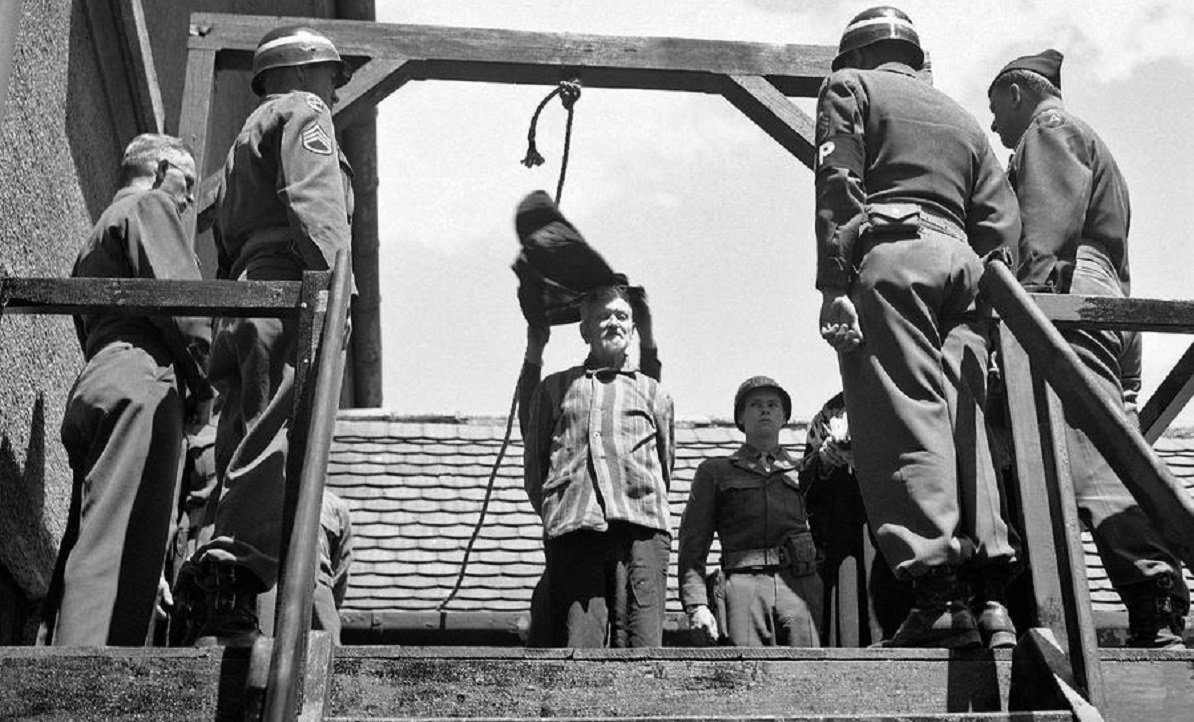 U.S.
military authorities prepare to hang Dr. Klaus Karl Schilling, 74, at
Landsberg, Germany, on May 28, 1946. In a Dachau war crimes trial he was
convicted of using 1,200 concentration camp prisoners for malaria
experimentation. Thirty died directly from the inoculations and 300 to
400 died later from complications of the disease. His experiments, all
with unwilling subjects.
U.S.
military authorities prepare to hang Dr. Klaus Karl Schilling, 74, at
Landsberg, Germany, on May 28, 1946. In a Dachau war crimes trial he was
convicted of using 1,200 concentration camp prisoners for malaria
experimentation. Thirty died directly from the inoculations and 300 to
400 died later from complications of the disease. His experiments, all
with unwilling subjects.